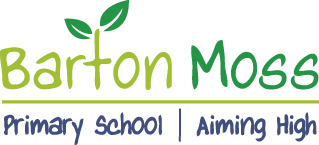Writing

At Barton Moss, our overarching ambition is for every child to be literate, ensuring that each pupil leaves Year 6 able to effectively communicate and express themselves through written language. To realise this vision, we have developed a cohesive writing curriculum that intertwines reading and writing through a thoughtfully crafted literacy spine. This spine not only engages students with a variety of high-quality texts but also fosters a love for reading and writing by establishing meaningful connections that enhance their learning across the broader curriculum.
The primary goals of our writing curriculum include:
- Diverse Text Exposure: Our literacy spine encompasses a wide range of genres, such as traditional tales, poetry, biographies, science fiction, and fantasy stories. This exposure helps systematically develop our children’s vocabulary and appreciation for various writing styles, which are essential for success in National Curriculum English.
- Stimulation and Engagement: Through daily, stimulating writing lessons, children are encouraged to spell accurately, write legibly, and master the fundamentals of grammar. We regularly conduct author studies and invite visiting writers—novelists, journalists, and poets—to inspire our pupils to aim high in their writing aspirations.
- In Nursery, teachers will implement dough disco and squiggles sessions to promote physical development and foundational mark-making skills, including letters, numbers, and shapes.
- In Reception and KS1, we adopt the Read Write Inc. systematic phonics scheme, which emphasizes phoneme-grapheme correspondence and blending skills. Children will engage in the transition of “hold a sentence” in the Autumn term, progressing towards writing fluency.
- Phonics sessions are structured around “revise, teach, practice, apply,” allowing children to take home decodable books that match their classroom phonics instruction, reinforcing their learning at home.
- Our “Talk for Writing” approach allows children to draw from their experiences, develop spoken language skills, and plan sentences verbally before committing them to paper.
- Planning Meaningful Writing Sessions: Teachers utilize the school’s writing construct to create sessions that enhance the children’s love for writing and consolidate their skills in line with our literacy spine.
- Cumulative Progressive Scheme: Children embark on a writing journey using texts from their year group's literature spine, which are carefully chosen to engage and challenge them while linking to the school’s termly core question. Grammar and punctuation objectives from the National Curriculum are seamlessly integrated into these learning journeys, giving students a real purpose for their writing.
- Learning Journey Components: During these journeys, pupils:
- Read WAGOLL (What A Good One Looks Like) examples linked to curriculum objectives and the specific genre being studied.
- Access a range of reading materials relevant to their writing topics, differentiated to meet all learners' needs.
- Use PATO (Purpose, Audience, Text, and Organisation) to guide their understanding of writing contexts.
- Plan, write, edit, and improve their own work.
- Study and create various genres.
- Perform their writing for different audiences.
- Develop spelling, grammar, and punctuation skills through lessons connected to their current texts.
- Enhance their proofreading and editing skills with one-on-one support.
Assessment and Monitoring:
- Writing Moderation Toolkit: Learning journeys are assessed using the Writing Moderation Toolkit, which outlines expectations for each year group and term. Teachers use exemplars from the toolkit to guide their instruction and ensure core composition, grammar, punctuation, and spelling standards are met.
- Over the year, teachers will revisit previously taught concepts and incorporate new learning into their writing journeys, ensuring continuity and progression.
Spelling and Handwriting:
- At Barton Moss, we follow the Read Write Inc. phonics and Spelling Shed programs to build children’s knowledge of spelling and letter formation from the outset. This ensures consistency in our approach to spelling.
- Children in Reception and KS1 are encouraged to read and spell their year group's common exception words. Teachers regularly monitor spelling and reading progress, and families can engage with their child’s learning using the Spelling Shed website.
- Daily Spelling Sessions: Children in Year 1-6 have a dedicated spelling slot each day, with spellings recorded in a spelling book and supported by the Spelling Shed Hive Game tool.
- Cursive Handwriting: From Year 3, children are taught cursive handwriting, which connects letters to facilitate faster writing.
Through our dedicated and comprehensive approach to writing, we aim to ensure that every child at Barton Moss leaves with the skills, confidence, and passion for literacy that will serve them well in their future endeavours.
